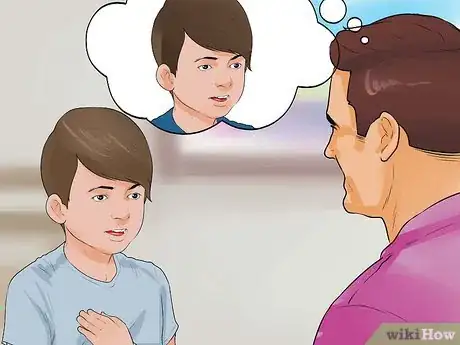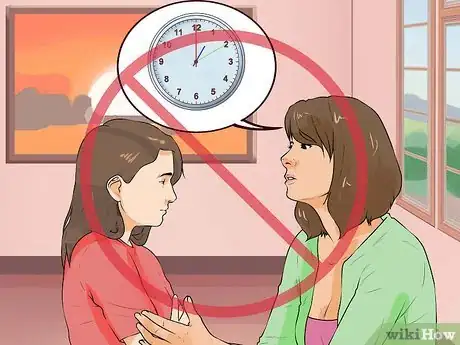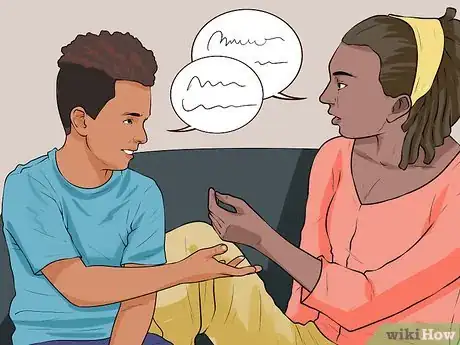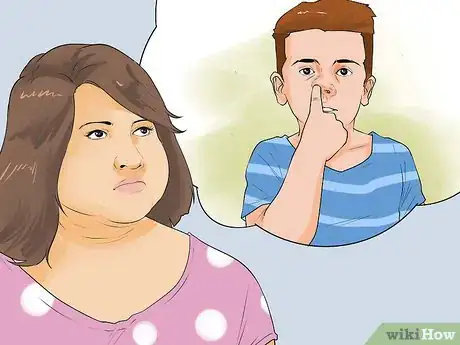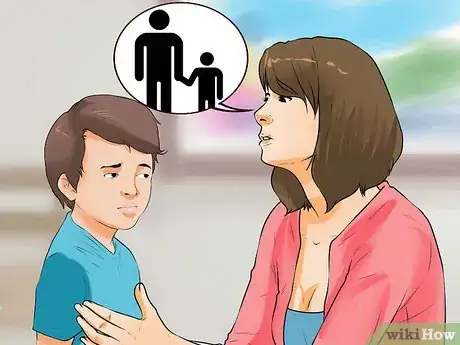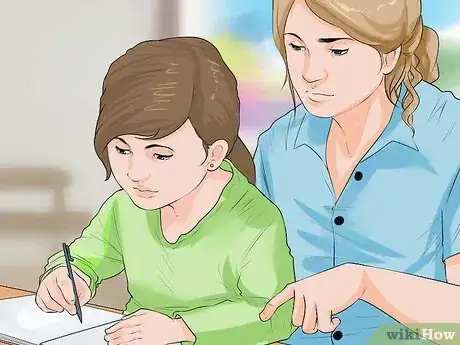This article was co-authored by Trudi Griffin, LPC, MS. Trudi Griffin is a Licensed Professional Counselor in Wisconsin specializing in Addictions and Mental Health. She provides therapy to people who struggle with addictions, mental health, and trauma in community health settings and private practice. She received her MS in Clinical Mental Health Counseling from Marquette University in 2011.
There are 7 references cited in this article, which can be found at the bottom of the page.
This article has been viewed 46,843 times.
Children, whether your own or someone else's, are often difficult to understand, or get along with. While some people are naturally good with children, many feel uncomfortable or impatient around them. Even liking your own children can be a challenge, especially as they pass through difficult developmental stages like puberty. Connecting with children requires care, thought, patience, and an understanding of the challenges of childhood.
Steps
Getting Along with Children
-
1Consider the child's perspective. Children can be difficult to understand or control, but they are human beings nonetheless. Childhood is difficult. Children are faced with a constant struggle to grow, and learn new things about the world. Try to be sympathetic, and think of children as people instead of mere annoyances.
-
2Avoid being too rigid. Children can seem irrational, preferring to live moment-to-moment rather than following rigidly defined schedules or plans. If you tend to think very logically at all times, this can be frustrating. Rather than trying to stick to a predefined schedule of activities, opt for a more open-ended plan, such as a trip to the park, or a simple play session in the child's familiar environment. Children often thrive in such unstructured activities, bouncing from activity to activity as their mood and level of energy changes.[1]Advertisement
-
3Speak honestly with parents about your issues. Explain that you have difficulty understanding and liking children, but are working to get better. Ask them for help in getting to know their child. Many parents are quite enthusiastic to teach others what they have learned through parenting, and few people are more well-equipped to understand the frustrations and pitfalls of interacting with children.
-
4Engage in conversation with kids. It is common to "talk down" to children, especially if you have little experience dealing with them. This should be avoided, as it can alienate a child. Don't try to limit your vocabulary, but instead talk to them in a normal, friendly tone, just as you would with an adult. Make sure the child has plenty of time to talk, and avoid telling long stories or speaking at length, as the child may have trouble sustaining attention.[2]
- Don't worry too much about whether the child you're talking to you will understand what you're saying. If the child is interested, he or she will often ask for clarification, leading to further possibilities for conversation.
- You should, of course, refrain from using inappropriate language, or bringing up "adults only" subjects around kids.
-
5Ask questions. Remember that children, while not yet fully developed, are people with personalities, interests and memories. Asking questions will help a child engage with you, since the child may not often feel comfortable speaking first in interactions with adults. The more you learn about a child's inner life, the easier it will be for you to see the child as a person of value.[3]
- A common mistake is to ask children overly "easy", simple questions. Ask open-ended questions, requiring more than a simple "yes" or "no" to answer. This will encourage the child to start a real dialogue with you.
- Avoid cliche questions like "What's your favorite subject in school?" Children are used to hearing these questions, and it may not seem to them that you're really interested in learning about them.
- Many children enjoy telling stories about themselves, and are often very gratified to have an adult listen to them. Ask if anything exciting has happened to them recently, or ask about any recent trips, holidays or other events in their lives.
-
6Respond to temper tantrums with patience. It is easy to become upset with a child who is displaying loud, dramatic behaviors like screaming, flailing, or holding their breath. You should resist the temptation to raise your voice, or become upset yourself. This will only worsen the tantrum, leading to increased frustration for both of you. Try to remain calm, and distract the child from whatever is upsetting him or her.[4]
- A favorite toy or game is a great way of distracting a child who is throwing a temper tantrum. You can also try talking with the child about something he or she enjoys.
- Funny faces are a parent's standby for combating temper tantrums in very young children.
-
7Expect disgusting behavior. Many people have a hard time getting over how gross kids can seem. Nose-picking, burping, drooling and other hard-to-watch behaviors may make you cringe, but they are nonetheless a normal part of a child's development. Try to keep an open mind, and remember that you probably displayed many such behaviors as a child. Ignore the behavior as best you can, and only intervene if the child's health or safety is in danger.[5]
-
8Practice deep breathing when you feel frustrated. Children are unpredictable, and often noisy, and can be of great annoyance to people who are not naturally patient. Take a deep breath, count to 10, and remind yourself that you are working towards a better relationship with children when you refuse to give in to impatience.[6]
Learning to Like Children in Your Household
-
1Understand that children change as they grow. All children pass through difficult stages, especially during puberty. Be patient, and try your best to guide your children through these stages, even if you sometimes find it difficult to like them.
-
2Talk to your child. While it may seem that you and your child occupy different planets, it is nonetheless important that you make an effort to communicate issues in your relationship. Try to be calm and diplomatic, and let your child know that you love him or her, and want your relationship to improve.
-
3Enforce fair rules. Many parents struggle to find balance between being too strict with their kids, and being too lenient. This can create tension in your relationship with your child, resulting in fighting and resentment. If you find yourself in constant conflict with your child regarding the rules of the house, then it may be time to reevaluate those rules.
- Over-emphasizing rules and discipline can be a burden on your relationship with your child. Strict rules are harder to enforce consistently, and put lots of pressure on your child.
- Being too lenient with children can make it difficult for them to respect you, and can lead to parents feeling powerless and used.
- Make changes to your disciplinary approach gradually, and be sure to talk to your child about why the rules are changing. Let your child know that you want your relationship to improve, and are trying to make changes to allow that to happen.
- Be sure to share your household rules with anyone else who cares for your child, so that the rules can be applied consistently, regardless of who is present.
-
4Choose activities to share with your child that you both enjoy. Don't simply go along with what your child wants or what other parents do with their children. If you consistently only do things with your child that you don't enjoy, you may grow to dread and resent being with them. If your child is old enough, talk to them about their interests, and try to explore areas of common ground to find activities you both enjoy.
- Feel free to let your child know if you don't enjoy an activity they want to pursue, such as watching an already familiar movie, or playing a video game. Offer your child some alternatives, or invite your child to do what the or she wants without you.
- Be patient and persistent. It may take time for you to discover areas of common interest with your children, but if you are successful your relationship will benefit greatly.
-
5Be forgiving. In a typical parent/child relationship, there is often plenty to disagree or feel resentful about. Household arguments can lead to lingering resentments that can cloud your relationship with your child, and push you apart. Make a conscious effort to be forgiving of your child once a situation has been resolved, rather than harboring resentment or being passive-aggressive.
- Being forgiving does not necessarily mean being lenient. Make it clear to your child that you will forgive him once the admits responsibility for his actions. Remind him that you love him unconditionally, and are working hard to improve your relationship.
-
6Show love and approval. A child who is often scolded or punished, and seldom praised, may start to believe that her parents don't love her. If you find yourself disciplining your child more often than praising her, take some time to sit down with her and express your love. Whenever you notice that your child has done well, or is proud of something she has accomplished, be sure to explicitly praise her, and tell her you are proud.
-
7Ask for help from other parents. Raising a child can be extraordinarily difficult, so there's no shame in reaching out for assistance. Your own parents, or other people in your community who have children, can be an excellent resource for advice.
-
8Talk with a counselor or therapist. If problems in your relationship with the children in your life have become overwhelming, and seem impossible for you to handle yourself, don't lose hope: there are many counselors and psychiatrists who specialize in family therapy. They are trained to help you, and your family, identify and solve problems in your relationships with one another.
- If you need help finding a family specialist, ask your doctor for a referral, or contact your medical insurance provider.
-
9Take action if you experience hateful thoughts. Violent thoughts about the children in your life are not normal. Even if you would never wish harm on a child when clear-headed, hateful feelings can become overwhelming, leading to potentially devastating, irreversible consequences for you and your family. If you feel that your children are in danger as a result of your own hateful or violent thoughts, place them in the care of a trusted friend or family member, remove yourself from the situation, and seek emergency medical help immediately. [7]
- Unwanted thoughts of harming your children may be a symptom of a serious mental illness such as Obsessive Compulsive Disorder. If you are experiencing such symptoms, you need and deserve the care of a professional mental health expert in dealing with your issues.
References
- ↑ http://www.scholastic.com/parents/resources/article/creativity-play/joys-doing-nothing
- ↑ https://www.psychologytoday.com/blog/the-mindful-self-express/201209/worst-mistakes-parents-make-when-talking-kids
- ↑ http://io9.gizmodo.com/scientific-studies-explain-the-best-ways-to-talk-to-chi-582531307
- ↑ http://www.webmd.com/parenting/tc/temper-tantrums-topic-overview
- ↑ http://www.med.umich.edu/yourchild/topics/badhabit.htm
- ↑ https://www.psychologytoday.com/blog/turning-straw-gold/201305/impatient-why-and-how-practice-patience
- ↑ https://www.psychologytoday.com/blog/culturally-speaking/201309/keep-my-children-away-me-i-m-dangerous
